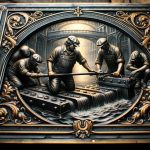Imagine venturing into the heart of the ocean, where the horizon meets the sky in an endless blue expanse. Here, amidst the towering steel structures of oil rigs, a unique group of professionals ply their trade.
They’re the oil rig welders, individuals whose skills are not just about joining metal pieces but ensuring the seamless operation of some of the world’s most crucial energy sources. But what draws many to consider this career path isn’t just the adventure or the demand for their expertise—it’s the potential for substantial earnings.
Here’s what you need to know about the financial rewards that come with this demanding job:
- Earning Potential: Understand the factors that influence how much these welders can earn, including experience, location, and the risks involved.
- Comparative Analysis: How do their earnings stack up against other welding professions?
- Risks and Rewards: A look into the high-risk nature of the job and how it correlates with their compensation.
- Opportunities for Growth: Insight into career progression and how it affects earning capacity.
Join us as we dive deep into the ocean of possibilities and explore what it means to be an oil rig welder, financially speaking. This isn’t just a job; it’s an adventure with a paycheck that reflects the courage and skill required to do it.
Contents
- 1 How Much Do Oil Rig Welders Make?
- 2 Education and Certification Requirements for Oil Rig Welders
- 3 The Importance of Work Experience for Oil Rig Welders
- 4 Essential Equipment for Oil Rig Welders
- 5 Key Skills Needed for Success as an Oil Rig Welder
- 6 Unique Challenges and Benefits of Working as an Oil Rig Welder
- 7 Factors That Affect the Salary of an Oil Rig Welder
- 8 Conclusion
How Much Do Oil Rig Welders Make?
Oil rig welders, the craftsmen of the sea and steel, earn a hefty sum for their perilous yet pivotal role in the energy sector. On average, these skilled individuals pocket between $70,000 and $120,000 annually.
Yet, it’s not just about clocking in and out; various elements play their part in shaping this figure.
| Factor | Influence on Pay | Example Impact |
|---|---|---|
| Experience | Seasoned welders command higher rates | A veteran might earn closer to $120,000, while a newcomer may start near the $70,000 mark. |
| Location | High-demand regions offer better pay | Areas bustling with oil activity might see salaries at the higher end of the scale. |
| Type of Employment | Contract workers often earn more | Short-term roles may offer premium rates to attract the necessary talent. |
| Specialization | Certain welding techniques are more lucrative | Mastery in methods like TIG or MIG welding can push earnings above the average. |
To thrive as an oil rig welder, one must blend skill with courage, welding metals high above the ocean or deep within its belly. With training sharper than the flame they wield and a resilience steeled by the waves, these welders not only secure the rig’s bones but also ensure the flow of energy that powers our world.
Education and Certification Requirements for Oil Rig Welders
To kick things off, let’s dive straight into the must-haves for those eyeing a career as an oil rig welder. These lads and lasses are the backbone of the offshore oil and gas world, tasked with a gig that’s both challenging and rewarding. Here’s a breakdown of the education and certification you’ll need to join their ranks:
Education and Training
| Requirement | Details | Source |
| Welding Courses | Completion of accredited welding courses covering basics, blueprint reading, and safety. | Technical Schools / Community Colleges |
| Hands-on Experience | Practical experience gained through apprenticeships or on-the-job training. | Workshops / Apprenticeships |
Certification
| Type | Description | Issuing Body |
| AWS Certified | American Welding Society certifications, such as Certified Welder (CW). | American Welding Society (AWS) |
| Specialized Certifications | Certifications focusing on specific techniques or environments, e.g., underwater welding for offshore projects. | Various |
Embarking on this career means you’re up for an adventure that’s not just any desk job. With the sea as your office and the sky as your ceiling, it’s a role that demands sharp skills and a hearty respect for safety. To succeed, you’ll need a mix of classroom learning and real-world welding chops, proving you can handle the heat (quite literally).
Before you can call the vast blue your workplace, getting the right certs under your belt is crucial. The AWS leads the pack, offering credentials that are gold in the industry. But don’t stop there; special certs can make you even more valuable, especially if they’re as unique as the rigs you’ll be working on.
So, if you’re keen on welding your way to a career that’s as rewarding as it is demanding, start with these educational and certification steps.
The Importance of Work Experience for Oil Rig Welders
Work experience significantly influences the earning potential of oil rig welders. This profession demands not only technical skills but also practical, hands-on experience to excel in the challenging environments of offshore oil rigs.
The Role of Work Experience
- Enhanced Skills: With years on the job, welders refine their skills, especially in unique welding techniques required for complex structures in oil rigs.
- Safety and Efficiency: Experienced welders are more adept at maintaining safety standards and efficiency, key factors in high-risk environments like oil rigs.
- Problem-Solving Abilities: Seasoned welders develop better problem-solving skills, crucial for on-the-spot decision-making in demanding conditions.
Impact on Earnings
| Years of Experience | Expected Earnings | Key Factors |
| Entry-Level (0-2 years) | $35,000 – $45,000/year | Basic skills, learning phase |
| Mid-Level (3-5 years) | $45,000 – $60,000/year | Developing proficiency, handling more complex tasks |
| Senior-Level (6+ years) | $60,000 – $80,000+/year | Advanced skills, specialized tasks, leadership roles |
- Certifications and Up-skilling: Alongside experience, obtaining advanced certifications like AWS can further boost a welder’s market value.
- Negotiation Power: Experienced welders often have greater leverage in negotiating higher salaries due to their proven track record.
- Specialized Roles: With experience, welders might transition into specialized roles or supervisory positions, which command higher salaries.
Essential Equipment for Oil Rig Welders
Oil rig welders are adept craftspeople, braving the seas to keep the energy world spinning. Their toolkit is not just metal and flame; it’s the very lifeblood of their craft. Here’s a breakdown of the indispensable equipment for oil rig welders and how each piece elevates their work and worth.
| Equipment | Function | Impact on Job Performance and Salary |
| Welding Machines | Enables the joining of metal parts with precision. | Direct correlation to the welder’s ability to execute complex welds, influencing salary positively. |
| Electrodes | Conducts the welding current to the metal being welded. | Quality and type of electrode affect the efficiency and quality of welds, impacting job performance and earnings. |
| Protective Gear | Ensures the safety of welders from hazardous welding environments. | Safety contributes to job consistency and longevity, indirectly affecting salary through reduced downtime and enhanced productivity. |
| Cutting Tools | Used for cutting metal to precise measurements. | Enhances the welder’s capability to perform precise cuts, boosting efficiency and the potential for higher earnings. |
In the tumultuous world of oil rigs, where the sea’s roar meets the spark of metal, these tools are more than mere objects. They are extensions of the welders themselves, enabling them to mould the rig’s skeleton with finesse. Mastery of these tools not only amplifies their performance but also acts as a lever, hoisting their salaries.
Key Skills Needed for Success as an Oil Rig Welder
To excel as an oil rig welder, mastering a set of crucial skills is imperative. These skills ensure not only the quality and safety of one’s work but also the structural integrity of the oil rig itself, which is paramount in the high-stakes environment of offshore drilling.
| Specialized Welding Proficiency | Oil rig welders must be adept in specific welding techniques tailored for the harsh offshore environment. This includes a thorough understanding of different welding processes suitable for various metals used on oil rigs. |
| Blueprint and Schematic Savvy | Being proficient in reading and interpreting blueprints and schematics is crucial. This skill ensures welders can accurately follow designs and specifications for constructing and repairing rig structures. |
| Safety Commitment | A relentless commitment to safety practices is non-negotiable. Oil rig welders must adhere to strict safety protocols to protect themselves and their colleagues from potential hazards inherent in their workplace. |
| Physical and Mental Resilience | The job demands working under extreme conditions, such as heights and confined spaces, often in varying weather. A high level of physical fitness and mental fortitude is required to cope with these challenges. |
| Technical and Vocational Education | A combination of formal education, hands-on training, and certifications in welding equip oil rig welders with the knowledge and skills necessary for their demanding roles. |
Navigating the intricate world of oil rig welding demands more than just technical prowess. It requires an unwavering dedication to safety, a keen eye for detail, and the physical and mental agility to tackle the unpredictable nature of the sea.
Unique Challenges and Benefits of Working as an Oil Rig Welder
Oil rig welders tackle some of the most arduous and critical tasks in the industrial world. Their role is demanding yet rewarding, as they maintain the infrastructure that powers our lives. Here’s a detailed look at the challenges they face and the benefits they reap.
| Challenges | Benefits | Context |
|---|---|---|
| Harsh Environment | Career Advancement | Oil rigs are in isolated locations, facing extreme weather and temperatures. |
| Physical and Mental Demands | Industry Importance | Welding on a rig requires stamina, precision, and mental fortitude. |
| Safety Risks | Sense of Pride | Risks include fires, electrical shocks, and respiratory hazards. |
| Long and Rotational Shifts | Technical Skill Growth | Extended periods away from home and irregular working hours. |
To dive deeper, the working conditions on oil rigs are notoriously harsh. Welders combat extreme cold, heat, and often dangerous sea conditions. They’re miles from the nearest land, isolated in a world where their craft becomes their life. The risks are high – fire hazards, explosions, and equipment failures. It’s a job for those who respect the might of the elements and understand the gravity of their responsibility.
However, with these challenges come unique rewards. For starters, there’s the sense of pride in knowing your work fuels industries and economies. It’s about being part of an essential gear in the colossal machine of energy production. Oil rig welders also have excellent opportunities for career progression. With experience, one can move into higher technical or supervisory roles.
In essence, being an oil rig welder is a test of skill, endurance, and character. It’s tough, no doubt. But for those with the grit and gumption, it’s not just a job.
Factors That Affect the Salary of an Oil Rig Welder
The salary of an oil rig welder is influenced by a blend of elements, each significant in its way, impacting their earnings directly. Let’s dive into the factors:
Experience
Experience is akin to gold in the welding world. Welders with years under their belt not only work with swifter efficiency but also possess a knack for navigating the unforeseen challenges that come with the job.
Location
Where you strap on your welding helmet matters. Regions with a booming oil and gas industry tend to reward their welders handsomely, reflecting the high demand and sometimes, the living cost of the area.

Type of Welding
Specialization is key. Mastering a specific welding technique can set you apart, making you the go-to expert for jobs that require a meticulous touch, hence, a higher pay.
Employment Type
Your job’s nature – be it full-time, part-time, or freelance – influences not just your wallet’s weight but your job’s steadiness too. Each has its perks and quirks.
Salary Range
The earnings can vary widely, with figures ranging from a respectable £70,000 to a staggering £120,000 annually, underlining the financial and creative satisfaction this career holds.
Let’s see how these factors table out:
| Factor | Description | Impact on Earnings |
| Experience | Seasoned professionals are more efficient and skilled. | Higher salaries due to proficiency and quick problem-solving abilities. |
| Location | Areas with high industry demand pay more. | Earnings are influenced by regional demand and cost of living. |
| Type of Welding | Specializing in a particular method. | Increases marketability and potential income. |
| Employment Type | Full-time, part-time, contract, freelance. | Affects salary and job security. |
To sum it up, navigating the world of welding on an oil rig is no small feat. It’s a craft where experience, location, your chosen specialization, and the nature of your employment intertwine to shape your earning potential.
Conclusion
Welders on oil rigs are hidden stars in the energy industry because they work in the middle of the ocean, where the sky meets the ocean. These skilled workers, who work on huge steel structures, not only build things that are important to our daily lives, but they also get paid a lot for what they do. With pay running from $70,000 to $120,000 a year, these people are full of excitement, combining skill with bravery in front of the sea.
Welders who work on oil rigs make a lot of different kinds of money. Their earnings depend on their experience, where they work, what they specialize in, and the type of work they do. People who have worked in this field for a long time, are good at specific welding methods, and live in oil-rich areas often get paid more than this range. The high-risk setting and difficult conditions in which they work also make the competitive pay deals meant to draw and keep good workers in this important industry stand out.
Even though this job is financially rewarding, you need more than just technical skills to do it. It takes a mix of bravery, toughness, and a strong dedication to safety. These are the traits that make sure the world’s energy lifelines work smoothly.





